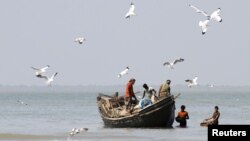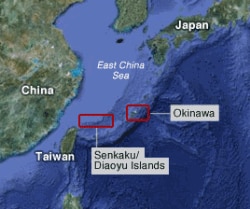BANGKOK, THAILAND —
Oil and gas development in the Bay of Bengal is being opened in areas previously disputed by Bangladesh and Burma. The peaceful resolution is being hailed as a model for similar maritime disputes among China and its neighbors. But analysts say disputes with Beijing are a lot trickier.
Bangladesh and Burma are eagerly awaiting bids from foreign companies to explore potentially rich oil and gas blocks in the Bay of Bengal.
Tribunal arbitration
The area is largely unexplored because it was the subject of a heated dispute for the past three decades that provoked tense standoffs between the two countries’ navies. But in 2009, they agreed to take the conflict to the International Tribunal for the Law of the Sea in Hamburg.
This March, the tribunal defined each country’s territory and both sides accepted it.
Tribunal Registrar Philippe Goutier says now there should be plenty of interest from foreign investors.
"Companies, which have to be granted permits, licenses, they want security. Legal security is the first element which has to be kept in mind for private companies, for example, or public companies which want to exploit resources in an area," said Goutier.
The tribunal's decision gave Bangladesh more sea territory while Burma got more overall territory.
While there were reports that some Burmese officials were unhappy with the deal, Gautier says both sides were pleased and expressed a sense of relief that the dispute was finally settled.
"It is a first case for the tribunal regarding delimitation of maritime areas. It is a first case involving delimitation beyond 200 nautical miles (370 kilometers). It is also the first experience before the tribunal for Asian countries. And, I think there is a future. I am convinced that there is a future for the tribunal in the handling of such disputes," said the tribunal registrar.
Goutier says the tribunal is ready to handle similar disputes over resource-rich territory in the East China and South China Seas if and when disputing parties are ready.
Beijing and Tokyo remain in a heated standoff over a small chain of islands known as the Diaoyu in China and the Senkakus in Japan. Earlier this year relations between China and the Philippines slipped after their ships faced-off over disputed territory in the South China Sea.
The incidents raised international concerns, most notably from the United States, which has security agreements with Japan and the Philippines.
Role model
U.S. Navy Admiral Samuel Locklear, who visited Bangladesh this month, praised the territorial deal between Burma and Bangladesh, and called it an excellent model to settle maritime conflicts with China. He repeated those sentiments Tuesday to journalists in Bangkok.
"These disputes must be managed in a peaceful way, that they must be done without significant coercion, that they must, that we would prefer that they be arbitrated through a rule of law mechanism," he said. "And, there are mechanisms out there to do that. And, we would hope that the parties involved in this would, as they look at this, and this is not just East China Sea, but South China Sea."
China disputes trickier
But analysts say conflicts in the East and South China Seas are more complicated than those in the Bay of Bengal.
China is a rising power and claims almost all of the South China Sea, putting it in conflict with claims by Brunei, Malaysia, the Philippines, Taiwan and Vietnam. Beijing says it is not willing to accept international arbitration and prefers to negotiate bilaterally.
Analyst Philip Andrews-Speed, of the Energy Studies Institute in Singapore, says unique factors led Bangladesh and Burma to make a deal.
"Well, I suppose the recent trigger would be the change of governance style, one might say, in Myanmar which allowed more openness on its own side and more credibility with its neighbor in Bangladesh," he said. "I think, compared to some of the other disputes that still exist in East Asia, you have two countries that are actually very poor. And, neither is seeking to dominate over the region. And, therefore I think it is easier for relative equals to come together for the mutual benefit."
Energy analysts say numerous foreign oil and gas companies are expressing interest in bidding for the Bangladesh and Burma exploration blocks.
Despite excitement over their potential, Andrews-Speed, a former oil exploration geologist, cautions that enthusiasm should be tempered. He says it could be a long time before it is known what amount of oil and gas they can produce, as well as what infrastructure may be needed to transport it.
Bangladesh and Burma are eagerly awaiting bids from foreign companies to explore potentially rich oil and gas blocks in the Bay of Bengal.
Tribunal arbitration
The area is largely unexplored because it was the subject of a heated dispute for the past three decades that provoked tense standoffs between the two countries’ navies. But in 2009, they agreed to take the conflict to the International Tribunal for the Law of the Sea in Hamburg.
This March, the tribunal defined each country’s territory and both sides accepted it.
Tribunal Registrar Philippe Goutier says now there should be plenty of interest from foreign investors.
"Companies, which have to be granted permits, licenses, they want security. Legal security is the first element which has to be kept in mind for private companies, for example, or public companies which want to exploit resources in an area," said Goutier.
The tribunal's decision gave Bangladesh more sea territory while Burma got more overall territory.
While there were reports that some Burmese officials were unhappy with the deal, Gautier says both sides were pleased and expressed a sense of relief that the dispute was finally settled.
"It is a first case for the tribunal regarding delimitation of maritime areas. It is a first case involving delimitation beyond 200 nautical miles (370 kilometers). It is also the first experience before the tribunal for Asian countries. And, I think there is a future. I am convinced that there is a future for the tribunal in the handling of such disputes," said the tribunal registrar.
Goutier says the tribunal is ready to handle similar disputes over resource-rich territory in the East China and South China Seas if and when disputing parties are ready.
Beijing and Tokyo remain in a heated standoff over a small chain of islands known as the Diaoyu in China and the Senkakus in Japan. Earlier this year relations between China and the Philippines slipped after their ships faced-off over disputed territory in the South China Sea.
The incidents raised international concerns, most notably from the United States, which has security agreements with Japan and the Philippines.
Role model
U.S. Navy Admiral Samuel Locklear, who visited Bangladesh this month, praised the territorial deal between Burma and Bangladesh, and called it an excellent model to settle maritime conflicts with China. He repeated those sentiments Tuesday to journalists in Bangkok.
"These disputes must be managed in a peaceful way, that they must be done without significant coercion, that they must, that we would prefer that they be arbitrated through a rule of law mechanism," he said. "And, there are mechanisms out there to do that. And, we would hope that the parties involved in this would, as they look at this, and this is not just East China Sea, but South China Sea."
China disputes trickier
But analysts say conflicts in the East and South China Seas are more complicated than those in the Bay of Bengal.
China is a rising power and claims almost all of the South China Sea, putting it in conflict with claims by Brunei, Malaysia, the Philippines, Taiwan and Vietnam. Beijing says it is not willing to accept international arbitration and prefers to negotiate bilaterally.
Analyst Philip Andrews-Speed, of the Energy Studies Institute in Singapore, says unique factors led Bangladesh and Burma to make a deal.
"Well, I suppose the recent trigger would be the change of governance style, one might say, in Myanmar which allowed more openness on its own side and more credibility with its neighbor in Bangladesh," he said. "I think, compared to some of the other disputes that still exist in East Asia, you have two countries that are actually very poor. And, neither is seeking to dominate over the region. And, therefore I think it is easier for relative equals to come together for the mutual benefit."
Energy analysts say numerous foreign oil and gas companies are expressing interest in bidding for the Bangladesh and Burma exploration blocks.
Despite excitement over their potential, Andrews-Speed, a former oil exploration geologist, cautions that enthusiasm should be tempered. He says it could be a long time before it is known what amount of oil and gas they can produce, as well as what infrastructure may be needed to transport it.





